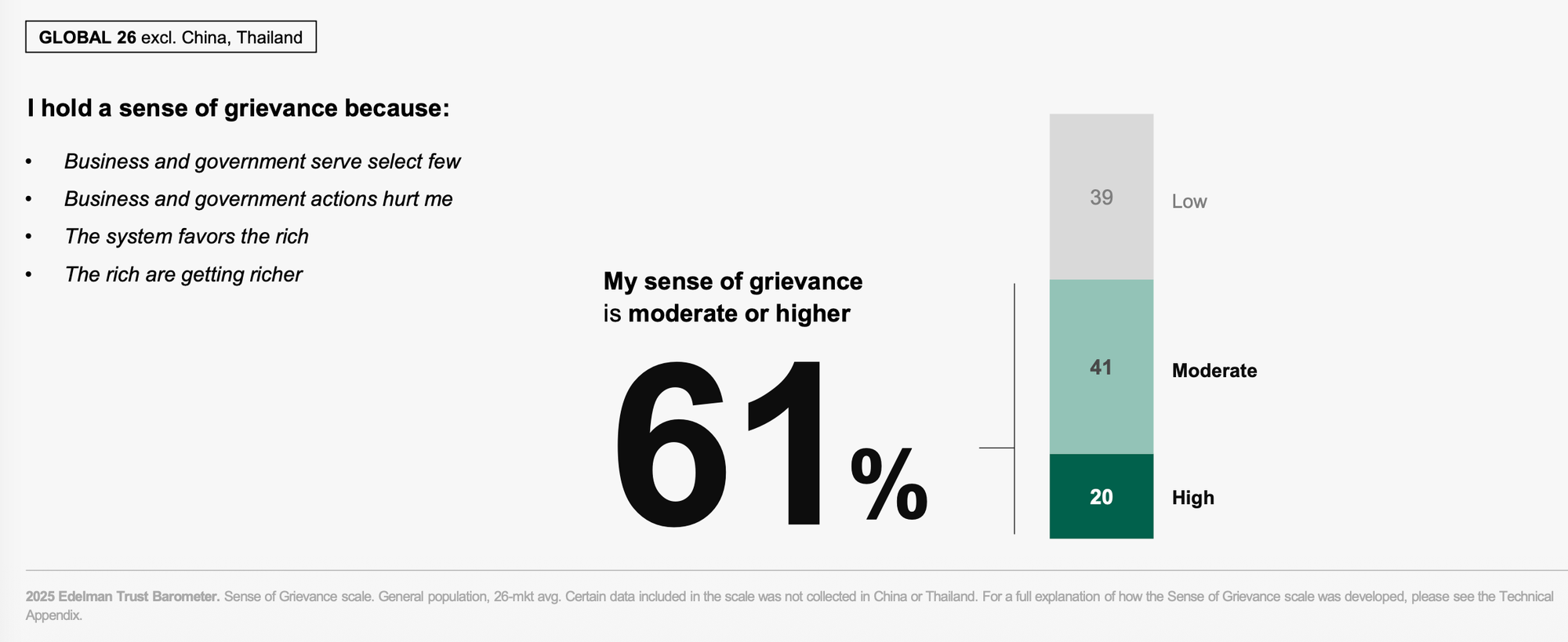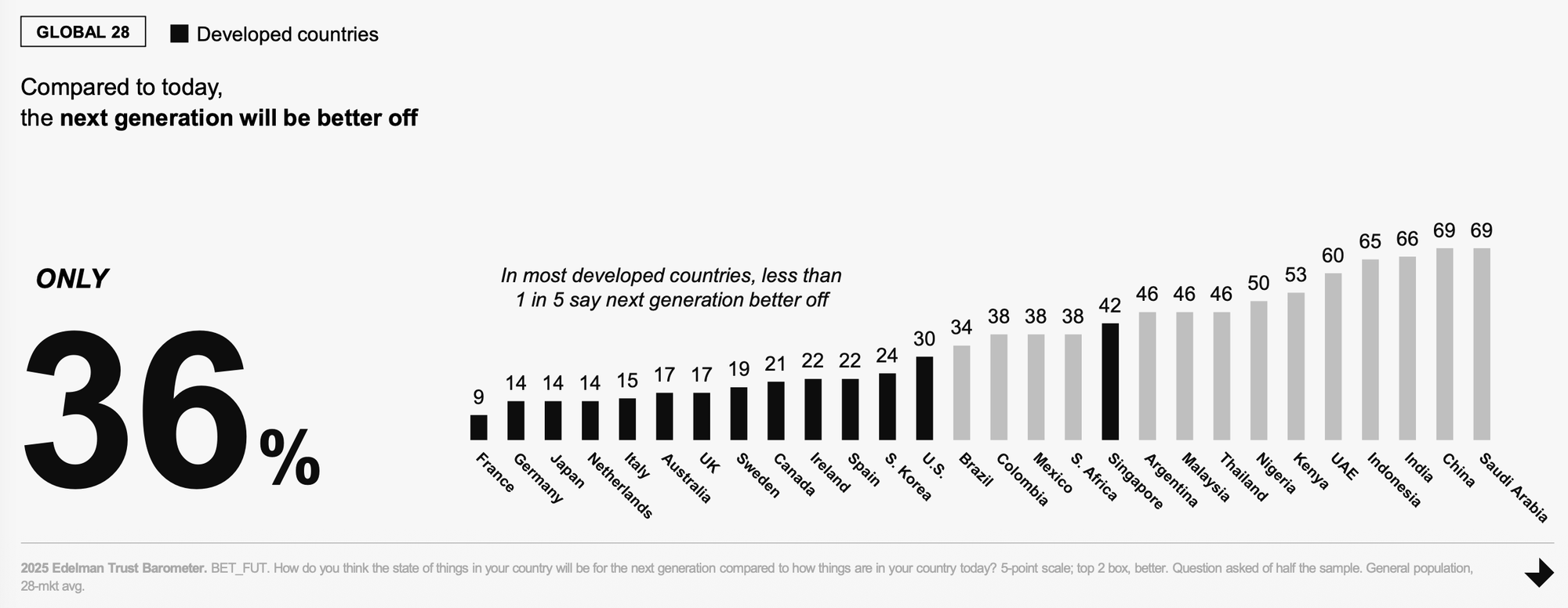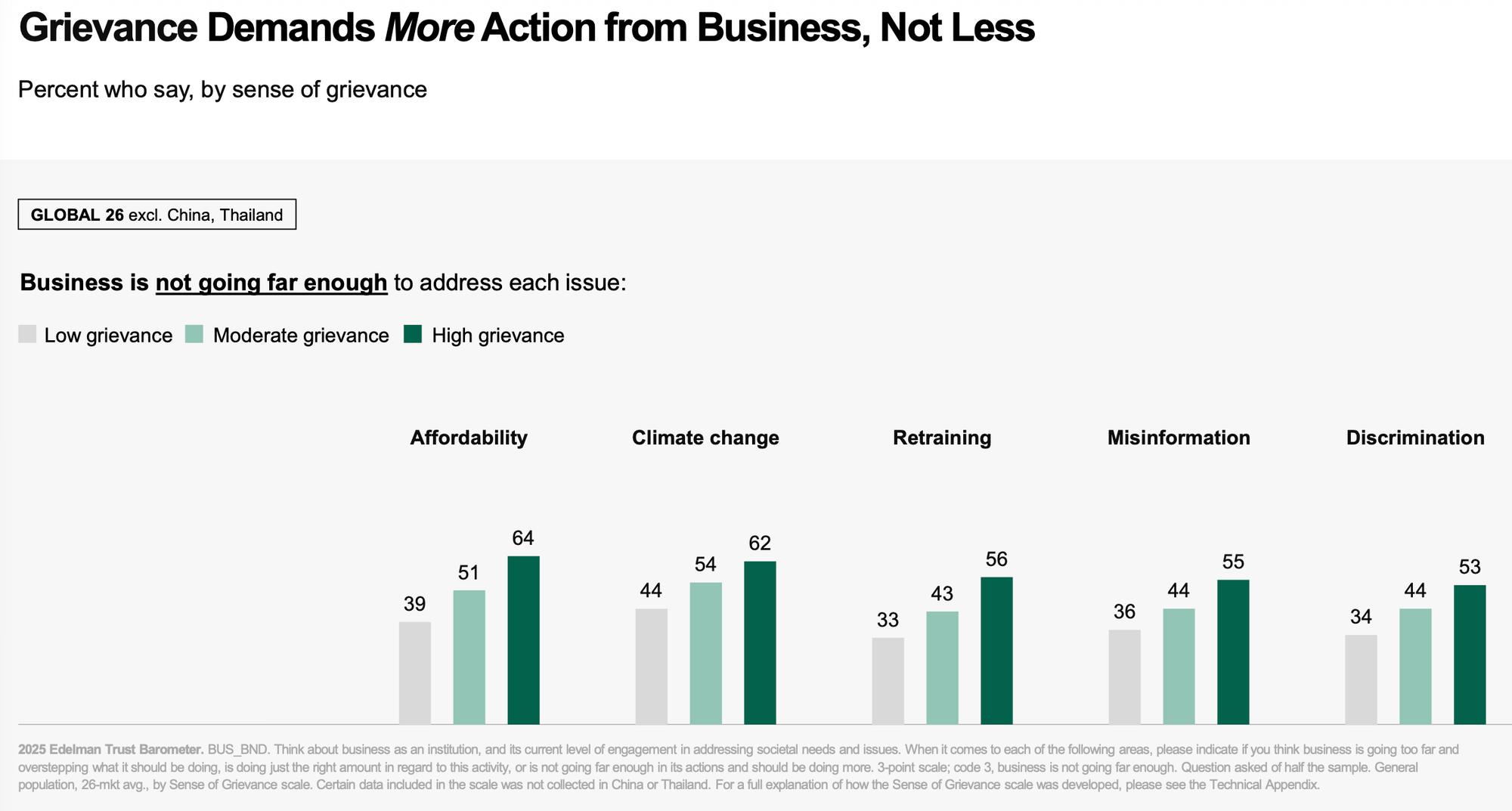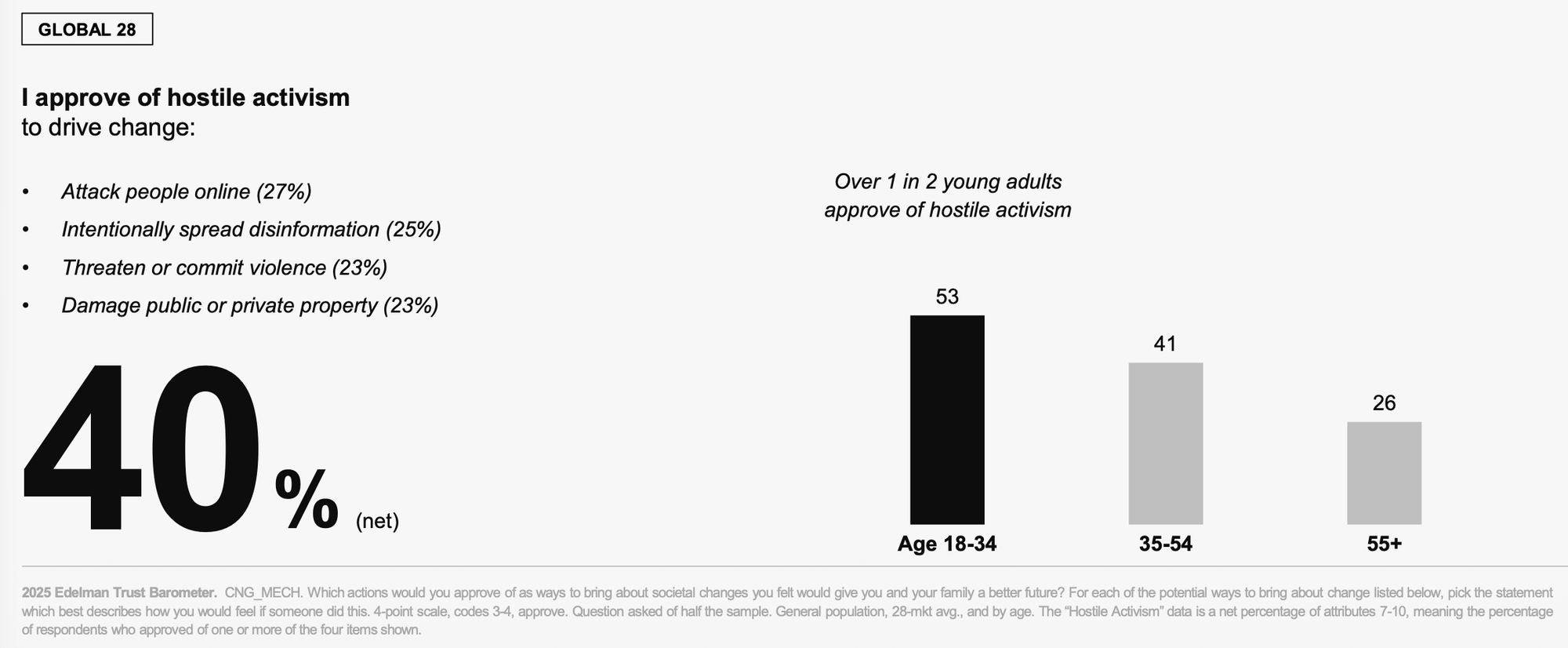The Grievance Economy

I stumbled upon the most damning indictment of our current economic system by accident. A couple of weeks ago, I was watching Jon Stewart interview the Right Honourable Dame Jacinda Ardern. Yeah, I know, thats a heck of a title. Anyway, she mentioned a statistic from the 2025 Edelman Trust Barometer to highlight her concern about the significant measure of global grievance. It stuck with me. I hadn't heard about the report which was released in January, and I was interested in what it said about how people feel around the world. And I was surprised that I hadn't heard anything about it before now.

After the show, I hunted it down and understood why it hadn't made bigger waves. It was released back in January, but its findings are so uncomfortable they were likely buried by the very systems they indict. What I read was not just a report, but a global scream of frustration. As I scrolled through the data, a horrifyingly clear pattern emerged: the countries that had most enthusiastically embraced the neoliberal economic and policy playbook for the last forty years were the ones performing the most terribly. This wasn't just a poll; it was a receipt for a failed ideology.

Its central finding is that a staggering 61% of people now hold a "moderate or higher" sense of grievance against the institutions that run their lives. They feel, correctly, that "the system favors the rich" and that "business and government actions hurt me."
This is not a sudden fever. It's the bill coming due for a 40-year ideological experiment that has dominated our economic and political life: neoliberalism. This project, sold to the public with comforting lies about "trickle-down" prosperity and "lifting all boats," was never about broad well-being. Its true purpose, laid bare by decades of policy, was the relentless concentration of wealth and power into the hands of a shareholder class, at the direct expense of workers, communities, and the planet.
A Global Report Card on a Failed Ideology
If you want to see the toxic legacy of shareholder primacy, look no further than the country-level data. The nations that most enthusiastically embraced the neoliberal playbook - deregulation, union-busting, and the worship of "market-rate returns" - are now drowning in the very distrust they created.
Consider the heartlands of this ideology: the United States, the United Kingdom, Germany, Japan, France. Not a single one musters a trust index above 50. These are not the numbers of healthy, functioning societies. They are the vital signs of a system in cardiac arrest. The populations of the world’s most "advanced" economies are telling us, unequivocally, that the game is rigged and they no longer trust the players.
This is not an abstract anger; it's a personal, kitchen-table fear. A dominant sentiment echoing across these nations is the quiet dread that "my family and I will be worse off in five years." This is the direct consequence of stagnant wages, the dismantling of worker protections, and the privatization of social safety nets. Economic risk has been systematically shifted from the corporation to the household, and people are realizing the promise of prosperity was a lie.

This collapse in belief has a devastating human cost. When asked if the next generation will be better off, the citizens of these same countries express a profound and heartbreaking despair. A mere 9% in France, 14% in Germany and Japan, 17% in the UK, and just 23% in the United States believe in a better future for their children. They have lived through four decades of an economy designed for extraction and have concluded, quite rationally, that it is consuming their children’s future.
The Dangerous Illusion of "Trust in Business"
At first glance, the report offers a convenient escape hatch for capital. Business remains the most trusted institution globally, seemingly floating above the wreckage of government and media. Some will seize this data point as proof that corporations, guided by the gentle hand of ESG and "stakeholder capitalism," can lead us out of this mess.
Do not be fooled. This is a dangerous illusion.
Business is not separate from the system that created this crisis; it is its primary engine. The "trust" it holds is a shallow belief in its competence to deliver goods and services, not a deep faith in its ethical commitment to society. It is the trust a person has in their dealer, not their doctor.

The report's own data exposes this fragility. Among the 61% of people with a high sense of grievance, their perception of business collapses. The moment people feel the sharp edges of the extractive system - the stagnant wages, the unaffordable housing, the hollowed-out communities - their trust in corporate ethics and competence evaporates. This is precisely why mainstream "impact" solutions like ESG are nothing more than an impact placebo, a marketing exercise designed to maintain the veneer of trustworthiness while the fundamental machinery of extraction grinds on.
When Trust Dies, What Comes Next?
There is a darker, more chilling datapoint buried in this report, one that speaks to the raw desperation of this moment. When trust evaporates completely, what rushes in to fill the void? The report finds a shocking level of acceptance for what it diplomatically calls “hostile activism” to force change. Globally, a staggering four in ten people now find at least one of these tactics acceptable. But the truly terrifying number is generational. Among 18-34 year olds, that acceptance skyrockets to 53%. Think about that: a majority of young adults, who have known nothing but the broken promises of our extractive economy, now believe that hostile tactics - from online attacks and disinformation to property damage and physical violence - are a justifiable path to change. This isn't a forecast; it's a measurement of a social fabric already tearing at the seams. It is the endgame of an extractive system: when people feel they have nothing left to lose, they condone tearing the whole thing down.

The Only Way Forward: Invest in Trust, Not Extraction
The Edelman report is not a revelation; it is a receipt. It is yet another data point confirming what millions already feel in their bones: the system has failed. The numbers are in, the case is closed. We know what the problem is. But unlike in decades past, we now have the frameworks for what comes next.
Visionary models like Kate Raworth’s Doughnut Economics provide a clear blueprint for a system that allows humanity to thrive within the planet’s ecological boundaries. This isn't a utopian dream; it's a practical guide being made real by a growing global movement. Organizations like the Wellbeing Economy Alliance (weall.org) are connecting governments, businesses, and citizen movements to build economies designed to deliver social justice on a healthy planet.
The time for talking is over. It's time to stop analyzing the decay and start investing in the regeneration. It is time to create the meaningful, tangible changes that can win back an economy that works for all.
Read more from the report here where you can download the full report. It is well worth the read and the call to action.
Member discussion